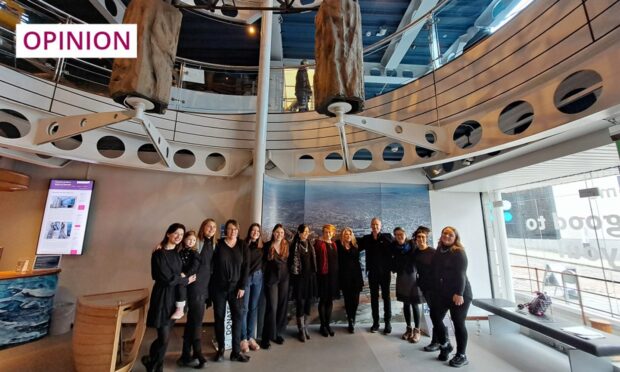“I really needed that today, thank you.”
I have been the choir leader for Aberdeen’s Harbour Voices Choir for over a year now, and it still makes me emotional every time I hear a participant say I’ve made a difference in their life – even if that simply means cheering them up and distracting them from their personal life for an hour.
Open to all, this community choir is aimed primarily at harbourside residents in the two close-knit communities of Fittie and Torry. My personal highlights have been performing at the reopening of the Maritime Museum, writing my own arrangements, and running my university project in conjunction with Harbour Voices and The Noise, Big Noise Torry’s adult community orchestra. Focusing on connection through storytelling, music and art, the participants wrote two original songs and painted two acrylic canvases.
Last year, I graduated from the University of Aberdeen with first-class honours: the last person in Scotland to graduate with an undergraduate community music degree. I am privileged to have received such an incredible education from Chris Gray and others, but what I am most grateful for is my journey of personal growth and confidence throughout university.
As a child, I was very shy. At a parent’s evening, one of my teachers laughed at me after I suggested I start singing lessons. “Sarah would never be able to stand up and sing in front of people.”
So, I played the cello and guitar instead, and would sing quietly in choirs. Fast-forward a few years, and I’ve performed solos at international and Scottish competitions with my former a cappella group, and have become a choir leader.
Everyone can sing – and everyone is welcome
“I can’t sing”, “I was forced to mime in choir”, and “I’m too shy” are phrases I hear all too often. I truly believe that everyone, even my out-of-tune dad, can sing. As a community music facilitator, I want to inspire and empower others to flourish in a musical setting. At university, I learned that “music making is a fundamental aspect of the human experience and is therefore an intrinsic and foundational part of human culture and society”. Everyone is, and always will be, welcome in Harbour Voices.
Our choir is free to attend. It is a safe space, open to all genders and ages, and is full of eager and friendly faces. We sing a whole range of different songs, from sea shanties to pop. All music is taught by ear, but we do sometimes provide free sheet music for those who can read it.
After we have done our warm-ups and have sung through our repertoire for the evening, we have plenty of time to chat and get to know each other, with free refreshments provided. If you’re lucky, one of our members will bring along some doughnuts. We also have social events outside of choir, too – tipsy limbo in Fittie on a night out being one of my favourite memories.
One choir member told me: “I love it! It is so welcoming, inclusive, fun, special and necessary on so many levels; it brings people together in a way that taps into that integral part of us all that needs to feel a sense of connection, community and belonging.”
Singing makes us happier and healthier
A key aspect of communal music-making is its positive impact on the health and social well-being of the participants. Singing is wonderful for our body and our mind. We start each session with a physical, respiratory and vocal warm-up, improving our posture, breathing and circulation.
When we sing, endorphins and dopamine, sometimes known as “happy hormones”, are released into the brain. Some members especially love the warm-ups, as they really help to get those present in the right frame of mind for singing after a long day at work.
If you’ve ever considered joining a choir, this is your sign to do it
According to experts Alexandra Lamont and Michael Murray, participating in music can help with “alleviating depression and anxiety by raising spirits; providing regular commitments to attend events which combat inactivity; and providing social support which reduces feelings of isolation and loneliness”. Our choir members can attest to this. “I always leave the session feeling uplifted and much better than I did when I came in,” one said.
As a community music facilitator, I believe in music’s “transformative power”, and I hope to continue to make a difference in Aberdeen.
If you’ve ever considered joining a choir, this is your sign to do it.
- Find out more about Harbour Voices Choir and how to join by visiting openroadltd.com/harbour-voices-choir
Sarah Boyle is choir leader for Aberdeen’s Harbour Voices community choir


Conversation